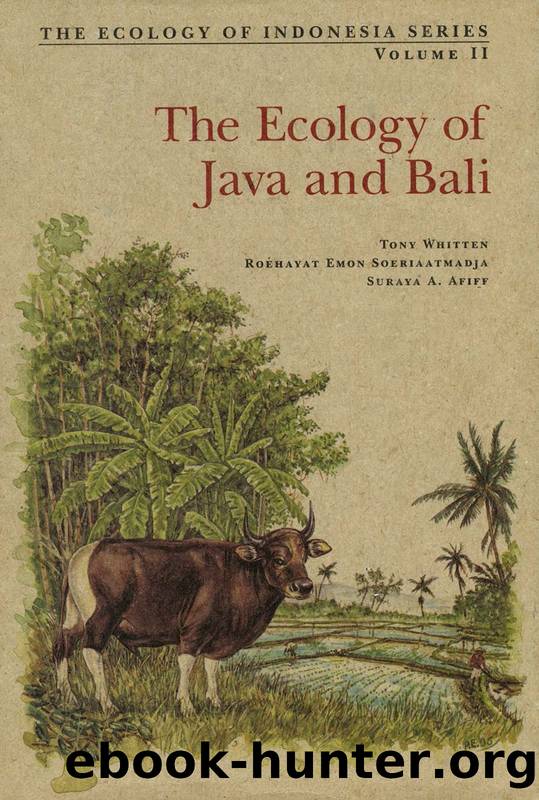Ecology of Java & Bali by unknow

Author:unknow
Language: eng
Format: epub
Tags: nature, ecology, Travel, Asia, Southeast, Special Interest, Ecotourism, Ecosystems & Habitats, Forests & Rainforests, Regional
ISBN: 9781462905041
Google: aP_PAgAAQBAJ
Publisher: Tuttle
Published: 2013-02-05T20:27:13+00:00
Integrated Pest Management
In late 1986 President Soeharto took a bold step and instituted a number of landmark ecological measures, the most radical of which was the ban on the use of 57 varieties of organophosphate chemicals on rice. These had been implicated in the resurgence or explosions of pest numbers due to the unintentioned demise of their predators. Never before had any country adopted ecological solutions to the problems of their major crop in such a sweeping manner. Even Greenpeace, not an organization known for its praise of Indonesia, has waxed lyrical about- this integrated pest management (IPM) strategy (Treakle and Sacko 1989). The Presidential Instruction placed emphasis on promoting the use of an insect hormone analogue which prevents the larvae from developing into adults (p. 657), while the only conventional pesticides permitted were certain systemic carbamates, and these only when severe pest outbreaks occurred. These were supposed to affect only the pest insects attacking the plants, but it is now known that other insects, including parasitoids, drink from the plants, and that the chemicals drip from the leaf tips into the water surface where many important insect predators live.
But IPM is a broader concept than just making do with less chemicals (Flint and van den Bosch 1990). It ultimately has much to do with empowerment of farmers. Indonesian IPM farmers are taught to become responsible managers of their own and their community's fields, solving problems, researching, training others, promoting, and organizing. While it is vital that farmers learn to think and act with consideration for the complexities of ecological systems, understanding that some insects and other animals in the rice fields are decidedly beneficial and will reduce the numbers of the pest organisms, it is equally important that human and social processes and local organizational capacity for development are given full rein. There is still a need for appropriate extension services and for the interpretation of scientific advances, but the farmers should be confident enough to be able to adapt, tune, or reject recommendations depending on their own agroecological realities.
The presidential decree was effectively the start of Indonesia's world-leading position in IPM, replacing regular calendar spraying with a variety of biological and cultivation controls, and spraying only when defined levels of infestation were exceeded. In addition, within two years of the decree, Indonesia had removed all the pesticide subsidies. The benefits of the decree have been highly visible, and this demonstrates how development which works with the natural ecosystem rather than against it can achieve dramatic results:
Download
This site does not store any files on its server. We only index and link to content provided by other sites. Please contact the content providers to delete copyright contents if any and email us, we'll remove relevant links or contents immediately.
China Rich Girlfriend by Kwan Kevin(4558)
The Silk Roads by Peter Frankopan(4525)
Annapurna by Maurice Herzog(3464)
Full Circle by Michael Palin(3443)
Hot Thai Kitchen by Pailin Chongchitnant(3380)
Okonomiyaki: Japanese Comfort Food by Saito Yoshio(2708)
The Ogre by Doug Scott(2679)
City of Djinns: a year in Delhi by William Dalrymple(2548)
Photographic Guide to the Birds of Indonesia by Strange Morten;(2527)
Vietnam, Cambodia, Laos & Northern Thailand by Lonely Planet(2451)
Tokyo by Rob Goss(2427)
Tokyo Geek's Guide: Manga, Anime, Gaming, Cosplay, Toys, Idols & More - The Ultimate Guide to Japan's Otaku Culture by Simone Gianni(2360)
Everest the Cruel Way by Joe Tasker(2338)
Discover China Travel Guide by Lonely Planet(2222)
Iranian Rappers And Persian Porn by Maslin Jamie(2195)
China (Lonely Planet, 11th Edition)(2159)
China Travel Guide by Lonely Planet(2146)
Lonely Planet China(2141)
Top 10 Dubai and Abu Dhabi by DK Travel(2095)
